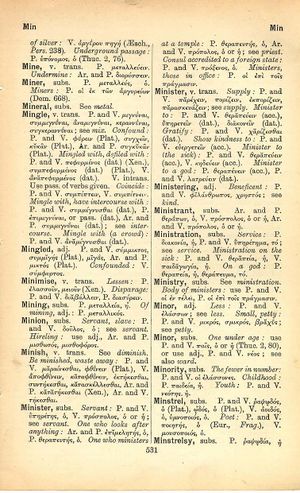minister
English > Greek (Woodhouse)
subs.
Servant: P. and V. ὑπηρέτης, ὁ, V. πρόσπολος, ὁ or ἡ; see servant. One who looks after anything: Ar. and P. ἐπιμελητής, ὁ, P. θεραπευτής, ὁ. One who ministers at a temple: P. θεραπευτής, ὁ, Ar. and V. πρόπολος, ὁ or ἡ; see priest. Consul accredited to a foreign state: P. and V. πρόξενος, ὁ. Ministers, those in office: P. οἱ ἐπὶ τοῖς πράγμασιν. v. trans. Supply: P. and V. παρέχειν, πορίζειν, ἐκπορίζειν, παρασκευάζειν; see supply. Minister to: P. and V. θεραπεύειν (acc.), ὑπηρετεῖν (dat.), διακονεῖν (dat.). Gratify: P. and V. χαρίζεσθαι (dat.). Show kindness to: P. and V. εὐεργετεῖν (acc.). Minister to (the sick): P. and V. θεραπεύειν (acc.), V. κηδεύειν (acc.). Minister to a god: P. θεραπεύειν (acc.), P. and V. λατρεύειν (dat.).
Latin > English (Lewis & Short)
mĭnister: tra, trum, adj. (
I gen. plur. ministrūm, Stat. S. 3, 1, 86) [a double comp. in form, from minus and comp. ending -ter, Gr. τερ-ος; cf.: magister, sinister, that is at hand, that serves, ministers (as an adj. only poet. and later): lumina (i. e. oculi) propositi facta ministra tui, that further, promote; promotive, or in a subst. sense, Ov. H. 21, 114: minister Grex, Sil. 11, 274: ardor, Lucr. 5, 297: ministro baculo, with the aid of a staff, Ov. Ib. 261.—
II Subst.
A mĭnister, tri, m., an attendant, waiter, servant; also a priest's attendant or assistant; likewise an inferior officer, underofficial; hence, transf., an aider in a good or bad sense, a furtherer, promoter, helper, an abettor, accomplice: centum aliae (famulae), totidemque pares aetate ministri, Verg. A. 1, 705: Phrygius, the cup-bearer Ganymede, Val. Fl. 5, 691; Mart. 12, 15, 7: Falerni, a cup -bearer, Cat. 27, 1: ministri publici Martis, Cic. Clu. 15, 43: hostia Inter cunctantes cecidit moribunda ministros, Verg. G. 3, 488: ministri imperii tui, inferior officers, under-officials, Cic. Q. Fr 1, 1, 3: regni, an assistant in the regal government, a minister, Just. 16, 1, 3: infimi homines ministros se praebent in judiciis oratoribus, i. e. inform the orators what the law is, Cic. de Or 1, 45, 146: legum, a minister, administrator, id. Clu. 53, 198: sermonum, a mediator, negotiator, Tac. H. 2, 99: consiliorum suorum, Vell. 2, 129, 3: Tiberius Alexander ... minister bello datus, Tac. A. 15, 28: ministri ac servi seditionum, Cic. Fam. 1, 9, 13: ministri ac satellites cupiditatum, id. Verr 2, 3, 8, § 21; so, furoris alieni, agents, instruments, Lact. 5, 11: libidinis, Cic Lael. 10, 35: socii scelerum atque ministri, Lucr. 3, 61: Calchante ministro, with the help of Calchas, Verg. A. 2, 100: ministrum esse in maleficio, Cic. Clu. 22, 60: minister fulminis ales, i. e. the eagle, Hor. C. 4, 4, 1: calidae gelidaeque (aquae) minister, one who serves, Juv. 5, 63: me nemo ministro fur erit, by my aid, id. 3, 46.—Esp. (eccl. Lat.), a minister of religion, a preacher of Christ: ut sim minister Christi, Vulg. Rom. 15, 16; id. Eph. 3, 7: fidelis, id. ib. 6, 21: Dei, id. 2 Cor. 6, 4: optimus, Aug. Conf. 10, 26.—Of inanimate things: sit anulus tuus non minister alienae voluntatis, Cic. Q. Fr 1, 1, 4: taedae, ardore ministro, suppeditant novum lumen, Lucr. 5, 297.—
B mĭnistra, ae, f., a female attendant, maid-servant; a female assistant or minister, at religious worship (class. only in the trop. signif.).
1 Lit.: una ministrarum, Ov. M. 9, 90; 306; 14, 705: accipiat missas apta ministra notas, Ov. A. A. 3, 470: ara deae certe tremuit, pariente ministrā, i. e. the Vestal Sylvia, id. F. 3, 47.—Also among Christians: ancillae, quae ministrae dicebantur, i. e. deaconesses, Plin. Ep. 10, 97, 8.—
2 Trop., a servant, handmaid; in a bad sense, an aider, accessory, abettor: ministra et famula corporis res familiaris, Cic. Tusc. 1, 31, 75: voluptatum satellites et ministrae, id. Fin. 2, 12, 37: Camilla delegit pacisque bonas bellique ministras, Verg. A. 11, 658.

